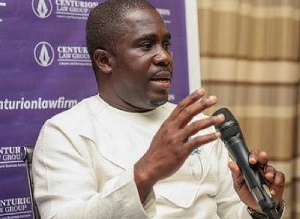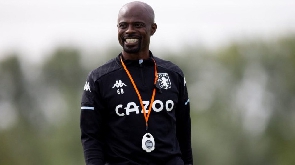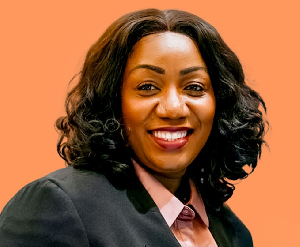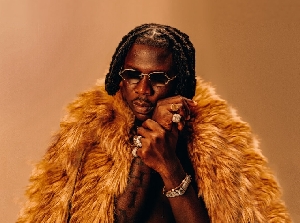To fully appreciate the gravity of the far-reaching implications of the neocolonialist tenor which the Convention People’s Party (CPP), chaperoned by President Nkrumah, represented, both on the Ghanaian political landscape and the African continent in general, it is worthwhile to examine the inimitably eloquent tribute paid Dr. Danquah by then-Nigerian president Dr. Nnamdi Azikiwe. And on this score, we must also highlight the fact that fifth among the fallacious grievances leveled against the Doyen of Gold Coast and Ghanaian politics regards the dastardly attempt by some fanatical Nkrumaists and Nkrumacrats to impugn the political integrity of the foremost constitutional lawyer of his time and arguably Africa’s most astute constitutional scholar-activist in the twentieth century.
Writing in an article titled “The Fallacies of J. B. Danquah’s Heroic Legacy” (Ghanaweb.com 6/4/06), Mr. Kwame Botwe-Asamoah screamed : “Fifth, did not Danquah and his brother ‘Sir’ Nana Ofori Atta I use their convivial relationship with the colonial government to deport Dr. Nnamdi Azikiwe from the Gold Coast in 1936, characterizing him as a nuisance in the country?”
We chose Dr. Azikiwe’s tribute to Dr. Danquah because we firmly believe that it poignantly captures the singular, institutional significance of the first Ghanaian to officially demand his country’s inviolable sovereignty of the British Crown. We shall also critically examine Dr. Azikiwe’s eulogy, particularly regarding the dire and objective implications of Dr. Danquah’s brutal assassination by the proverbial African Show Boy via the latter’s equally flagrant and unilaterally instituted Preventive Detention Act (PDA) in 1958, barely a year into Ghana’s postcolonial dispensation:
PRESIDENT AZIKIWE EULOGIZES THE LATE DR. DANQUAH
[“His Excellency, Dr. Nnamdi Azikiwe, President of the Federal Republic of Nigeria, in a eulogy in memory of the late Dr. J. B. Danquah, has said that he [i.e. Dr. Danquah] was a pioneer[ing] West African Scholar, Lawyer, Journalist, Poet and Fighter for human freedom, for which glorious cause he paid the supreme penalty”].
The following is the full text of Dr. Azikiwe’s eulogy: By the death of Joseph Boakye Danquah, the world has lost a valued ally in the crusade for human freedom and Africa has lost a great champion of fundamental human rights.
It is not universally appreciated [as it ought to] that Dr. Danquah was probably the first West African to obtain the doctorate in philosophy from a British University, when his dissertation on Akan Law and Customs was accepted for the Ph.D. Degree by the University of London in 1927-28.
As a journalist, Dr. Danquah was proprietor and editor of what is assumed to be the first daily newspaper in Ghana, which he christened [the] Times of West Africa. This was in 1932 [sic] and under the pen-name of ‘zadig,’ he maintained a column which he used to expose cant and criticize the hypocritical practices of his day.
The Times of West Africa advocated fundamental human rights and denounced the domination of man by man under the regime of imperialism. Dr. Danquah constantly reminded the colonial government that the Bond of 1844 did not transform the people of Ghana into chattels, but reserved to them their freedom until the time when they would be able to regain it.
When the Gold Coast Government introduced the Sedition Ordinance in 1934, Dr. Danquah was the secretary of the delegation, under the leadership of his brother, the late Nana Sir Ofori-Atta, which was sent by the Gold Coast people to the Colonial Secretary (Lord S. Winton, then Sir Philip Cunliffe-Lister).
Two years later, Mr. Isaac T. A. Wallace Johnson of Sierra Leone and I [i.e. Dr. Azikiwe] were to make history by being the first persons against whom this Law was first tested. One of the Crown Counsel who prosecuted us was the late Sir Algermon Brown, who died in office as Chief Justice of Northern Nigeria, ten years ago [1955?].
In the latter part of 1947, when the NCNC [ the National Congress of Nigeria and the Cameroons] delegation was returning from London, Dr. Danquah joined “Pa” [George] Grant and Mr. R. S. Blay and other Ghanaian patriots to give us a grand reception in Sekondi. Dr. Danquah then informed me of what they had heard about a young Ghanaian who was then editing The New Africa in London, under the auspices of the West African National Secretariat with the collaboration of Bankole Awoonor-Renner. That was when I [Nnamdi Azikiwe] assured them that this budding leader was wasting his talent in London and that his services could be of invaluable help in the struggle of Ghana for a place under the sun. That personality happened to be Dr. Kwame Nkrumah, first President of the Republic of Ghana.
It is an irony of history that a great pioneer of Ghanaian scholarship should die in a detention camp, barely eight years after his country had become free from foreign domination.
During my brief stay in Ghana (1934-37), Dr. Danquah and I did not often see eye to eye politically, but we were sensible and mature enough to respect each other’s right to state his opinion as he sees fit, and our friendship has endured until his lamented death.
As one who fought side by side with Dr. Danquah in order to liquidate colonialism in Africa, I personally regret the circumstances surrounding his death. All who honestly believe in human freedom would have wished it were otherwise.
I fought against the colonial regime because, in spite of the material prosperity and protection guaranteed us, as colonial peoples, it denied us fundamental human rights. Consequently, my idea of independence is a state of political existence where every person shall enjoy human rights under the rule of law. This was what I meant when I spoke of respect for human dignity at my inauguration as the first African Governor-General of this country [i.e. Nigeria]. I am sorry that Dr. Danquah died in a detention camp. I wish that he had been tried publicly, told what offence he was alleged to have committed, given a fair opportunity to defend himself, and then either discharged or punished, depending upon the fact, whether or not his innocence has been established or his guilt proved beyond any reasonable shadow of doubt.
I am of the considered opinion that if independence means the substitution of alien rule for [with?] indigenous tyranny, then those who struggled for the independence of former colonial territories have not only desecrated the cause of human freedom[,] but they have betrayed their peoples.
To Mrs. Elizabeth Danquah and the members of the mourning families, I send my condolences and those of Nigerian fighters for human freedom. If the lessons of history mean much, then the sacrifice of West Africa’s pioneer[ing] scholar, lawyer, journalist, poet, statesman and fighter in the cause of human freedom will not be in vain. Dr. Joseph Boakye Danquah has paid the price of leadership. May his soul rest in peace” (see www.susubiribi.com/JBDEU.htm).
At this juncture, it is not quite clear to me why “Dr.” Kwame Botwe-Asamoah chose the 1937 deportation of Dr. Nnamdi Azikiwe from Ghana as an occasion for obloquy or vitriol against the undisputed Doyen of Gold Coast and Ghanaian politics. For the preceding full-text eulogy for Dr. Danquah by Dr. Azikiwe offers, perhaps, the most caustic and mordant criticism of President Nkrumah’s apparently poor regard for fundamental human rights, in a manner that appears to have made many Ghanaians almost bitterly regret their unstinted struggle against British colonialism. For in the wake of the heroic and tragic death of Dr. Danquah, then-President Azikiwe, ever the courageous and astute statesman, minced no words in poignantly describing his Ghanaian counterpart as an abominable neocolonialist or a political “Afropean,” as a well-known African-American intellectual-activist would have more poetically cast matters. And to the preceding effect, we appositely recall the following paragraph from Dr. Azikiwe’s eulogy to Dr. Danquah: “I am of the considered opinion that if independence means the substitution of alien rule for [with?] indigenous tyranny, then those who struggled for the independence of former colonial territories have not only desecrated the cause of human freedom[,] but they have [unpardonably] betrayed their people.”
And, of course, Dr. Azikiwe is more than sophisticated and morally clinical enough to observe the virtual absence of the salutary rule of law in Nkrumah’s Ghana, particularly in the wake of the CPP’s summary enactment of the Preventive Detention Act (PDA) barely a year into Ghana’s reassertion of her sovereignty from British colonial rule: “I am sorry [to learn] that Dr. Danquah died in a detention camp. I wish he had been tried publicly, told what offence he was alleged to have committed, given a fair opportunity to defend himself, and then either discharged or punished, depending upon the fact[s], whether or not his innocence has been established or his guilt proved beyond any reasonable shadow of doubt.”
But, of course, those of us who have devoted ample and reasonable effort and time poring over documents and other relevant material pertaining to the Nkrumah era fully appreciate the fact that the Nkrumah tenure was replete with flagrantly shadowy dealings and woefully short on reason and the justiciable rule of law (see also Okoampa-Ahoofe, “Dr. J. B. Danquah: Architect of Modern Ghana” [iUniverse.com, 2005]).
Naturally, as human beings who were equally astute and proud of their pioneering leadership achievements, Danquah and Azikiwe had their fair share of differences; however, contrary to what Mr. Botwe-Asamoah, a fanatical Nkrumacrat, would have his readers believe, at no juncture did the cordial relationship between the two intellectually mercurial leaders reach such rancorous level as to provoke the incurably democratically-minded Danquah to rather sophomorically engineer the summary deportation of Azikiwe from Ghana. And regarding the preceding, this is what President Azikiwe himself had to say in the tragic wake of the assassination of Dr. J. B. Danquah by President Nkrumah: “During my brief stay in Ghana (1934-37), Dr. Danquah and I did not often see eye to eye politically, but we were sensible and mature enough to respect each other’s right to state his opinion as he sees fit, and our friendship has endured until his lamented death.”
Now, compare the preceding with the terror-charged political climate induced by the Nkrumah regime, which gratuitously and criminally sought to squelch the salutary, democratic culture of tolerance for ideological dissent.
But, perhaps, even more tellingly, Dr. Azikiwe poignantly observes the fact that two years prior to the British colonial Sedition Ordinance’s being used against him as well as the renowned Sierra Leonean leader Isaac Wallace T. A. Johnson, then also resident in Ghana, Dr. Danquah and Nana Sir Ofori-Atta I had, indeed, used their “convivial relationship with the colonial government,” in the vitriolic and sarcastic words of Mr. Kwame Botwe-Asamoah, to vigorously fight for the repeal of the blatantly inimical ordinance. Here again, this is what Dr. Azikiwe, the man whose summary deportation from the erstwhile Gold Coast is purported by some CPP apparatchiks to have been singularly engineered by Nana Ofori-Atta I and Dr. Danquah, had to say pertaining to this matter: “When the Gold Coast Government introduced the Sedition Ordinance in 1934, Dr. Danquah was the secretary of the delegation, under the leadership of his brother, the late Nana Sir Ofori Atta, which was sent by the Gold Coast people to the Colonial Secretary (Lord S. Winton, then Sir Philip Cunliffe-Lister). The delegates were bluntly told that it was not intended to repeal or modify this Law.”
It is also interesting and significant to observe in the above that Dr. Nnamdi Azikiwe noted that the Ofori-Atta-led delegation, of which Dr. Danquah was the secretary, had been “sent [to London’s British Colonial Office] by the Gold Coast people,” rather than the people of Akyem-Abuakwa, as Mr. Botwe-Asamoah and other Nkrumacrats would have their supporters and audience believe. Or maybe, it is just that the lucid geopolitical terminology of “Nationalist” is too complex for the hare-brained likes of Mr. Botwe-Asamoah to fully appreciate. Indeed, among the Akan of Ghana, there is a dictum which states that if one is unable to succor to the needs of one’s in-laws, the last thing that one ought to consider is to brazenly attempt to, literally, take them to the cleaners, as New Yorkers would say. In sum, it appears that woefully coming up short with any damning evidence of moral turpitude against Dr. Danquah and Nana Ofori-Atta I, Mr. Botwe-Asamoah chose the primrose path of letting Neo-Pharaoh Abu Jihad concoct something for him. A rebarbative, to be certain, which is why the poor, aging desperado also inexplicably contradicts himself by observing, rather apologetically, that: “It was Ofori Atta I [the very moral reprobate who, according to Mr. Botwe-Asamoah, fathered Nana Akyea-Mensah at 15 years old and also constantly harassed all non-Akyem residents of his kingdom] who crowned my father [the elder Botwe-Asamoah?] (a poor cocoa farmer) ‘Ohene’ [or chief] early 1930.”
Mr. Botwe-Asamoah also plaintively writes: “Yes, I am an Ewe by lineage, but if you (Dr. Ahoofe) and I go to Akyem Abuakwa today to contest any election, I will defeat you miserably, including Kyebi Tetteh.”
Well, well, well – whoever said that an Akyem-Abuakwa Baamu(hene) heir like Kwame Okoampa-Ahoofe would fatuously deign to contest a parliamentary, or even a district assembly, seat with such an indelibly “dirty politician” (and here, mind you, reader, I am merely using Mr. Botwe-Asamoah’s own words) and a desperate political propagandist? And what is more, the last time that I checked, in 1975, I believe, Kyebi-Tetteh had been renamed Akyem-Asikam or Kyebi-Asikam. But then, again, what makes Mr. Botwe-Asamoah associate Kwame Okoampa-Ahoofe with “Kyebi-Tetteh”? Or, here again, is Neo-Pharaoh Abu Jihad up to his dirty (snake-in-the-grass) tricks again?

Views expressed by the author(s) do not necessarily reflect those of GhanaHomePage.


















